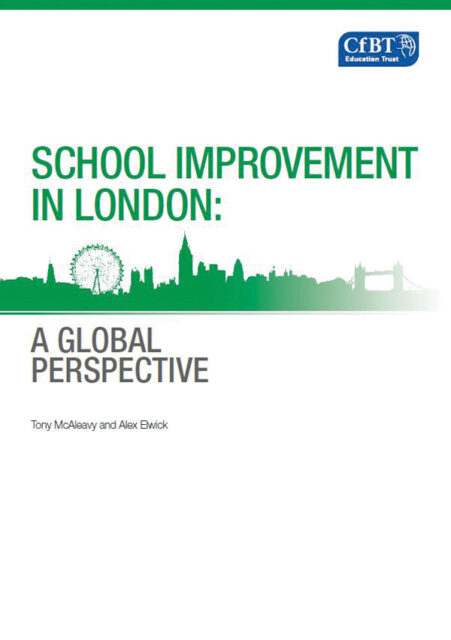Research: School Improvement in London: A global perspective
Publisher: CfBt
Amidst all the doom and gloom and manufactured crisis narratives in education, there are some small but remarkable good news stories. One is the steady improvement in GCSE passes in England. Admittedly, much of this is likely to be as a result of schools finding ways to ensure that their results look as good as they possibly can, rather than any underlying improvement, as observers such as Professor Robert Coe have eloquently explained.
But grades have improved, from an average of 50 per cent of students being awarded five or more good GCSEs in 2001 to just over 60 per cent reaching the same standard in 2013. In inner London, the story is much more impressive: from under 40 per cent in 2001 to about 63 per cent in 2013.
In June 2014, the Institute of Fiscal Studies (IFS) published “Lessons from London schools for attainment gaps and social mobility”, and in October, the University of Bristol’s Centre for Market and Public Organisation (CMPO) published “Understanding the success of London’s schools”. These reports followed investigative work by Chris Cook at the Financial Times, who also looked at what has become known as the “London effect”.

Before these reports, there was a great deal of speculation about what may have improved GCSE results in London, much of which was based on intuition and assumption. The research now published has gone some way to answer questions. Some are rigorous, academic studies. But some are not. The CfBT is firmly in the second of these categories.
“School Improvement in London: A Global Perspective” follows a longer report written by CfBT last year. It repeats some startling claims and uses some highly selective data. It also uses hearsay from interested parties, and at the heart of the report are clear conflicts of interest. As a result, it is almost a case study in policy-based evidence.
It finds that what has happened in London is “relevant to policymakers and educationists worldwide” and that “the improvement is not a consequence of the advantages that London has over the rest of England”, neither of which is supported by the evidence that is currently available. It claims that “the transformation since 2000 in London schools has been remarkable” whilst ignoring the fact that outer London was one of the highest performing areas of England in 2001.
The only dataset used by CfBT is the “proportion of pupils achieving five or more good GCSEs”. While this shows London in a good light, it does not take into account the findings of the IFS and CMPO reports that showed the improvement of London GCSE results can be attributed entirely to higher prior attainment at primary school and the ethnic composition of those who take GCSEs in the capital.
The CfBT report is awash with “halo effects”, whereby interested parties interpret improved GCSE results in London as being a direct consequence of various government and third-sector initiatives, rather than due to the efforts of children and families who live and study in one of the world’s biggest, toughest, most ethnically diverse and ambitious cities.
There seems to be little doubt that London schools have improved in the past 15 years. But there is virtually no evidence to support the conclusions of this report that it is because of academies or competition or collaboration, and a great deal to suggest that valid explanations for the London effect can be found elsewhere, such as the IFS’s claim that it appears to be due to improvements in primary schools and, in the conclusion arrived at by Professor Simon Burgess, writer of the CMPO report, that “ethnic minority pupils have greater ambition, aspiration, and work harder in school. This is the main argument here – London has more of these pupils and so has a higher average GCSE score than the rest of the country.”












Your thoughts